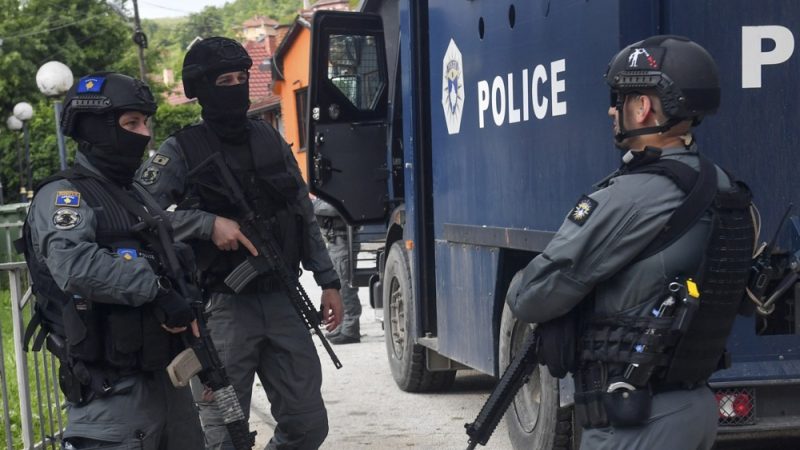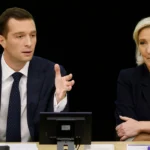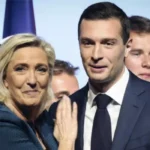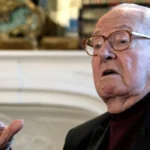Seven ethnic Serbs recently resigned from their posts in the Kosovo police, prompting President Vjosa Osmani to denounce Belgrade’s influence, which she says is behind the resignations.
The police officers in question resigned over the weekend, with more expected to follow suit in the coming days, according to local experts and analysts.
“There is already confirmed information, according to the investigations of our institutions during these weeks, that the endangerment of these members, the intimidation, the blackmail, come directly from Belgrade,” said Ms. Osmani.
The president asked the European Union to take action against her Serbian counterpart Aleksandar Vučić, because it is a violation of the Brussels agreement. She added that international officials know that the pressure for these resignations is coming from Serbia.
At the end of 2022, Kosovo Serb police, politicians and local officials resigned from their posts en masse over Pristina’s plan to enforce a rule that only license plates issued by Kosovo can be used by residents and citizens of the country. This measure would have an impact on some of the Serbs in the north who continue to use plates issued by Belgrade despite Kosovo’s declaration of independence in 2008.
This led to the announcement of an election to replace local officials and Serbian mayors in the north of the country, an area mainly inhabited by ethnic Serbs. But the Serbs did not stand as candidates and abandoned the vote on Belgrade’s orders.
The result was a turnout of 3.4% and the election of ethnic Albanian mayors. Although some mayors have appointed Serb employees and deputies, part of the population of Serb origin protested when the latter tried to enter their offices. This situation escalated to the point where members of NATO peacekeeping troops were seriously injured, as well as journalists, police officers and citizens.
The situation has led to a stalemate between Pristina and Belgrade, with the former reluctant to withdraw special police units from the north until the situation is secure. Belgrade, on the other hand, says the situation will not calm down until the units are withdrawn.
Kosovo has pledged to hold new elections, but insists on the need for Serbs to participate.
EU and US interventions aimed at de-escalating the situation have mainly focused on what steps Kosovo should take, which has drawn disappointment and criticism from Kosovars.
Since then, Kosovo has been hit by European sanctions, which have led to the suspension and withdrawal of funding and the exclusion of various regional initiatives.
Ms. Osmani and Prime Minister Albin Kurti have previously condemned Belgrade’s interference in Kosovo’s national affairs. These include the pressure exerted on Serbs to resign, not participate in elections or vote, and the constant lobbying against the recognition of Kosovo by other countries and international organizations, so many elements which constitute a violation of the Brussels agreement of 2023.
Serbia has yet to react to the latest allegations of interference, but in November 2022, following the resignation of local Serbian officials in Kosovo, President Aleksander Vucic said the allegations were “nonsense” and reassured Kosovo Serbs, telling them that Belgrade “would take care of them”.
“It’s not easy [to leave], but no one wanted to stay without being with their people, people feel it at every step,” he added.
Over the summer, calls for a reassessment of the EU and US stance on Kosovo and Serbia grew. In early August, British MP and chair of the Foreign Affairs Committee, Alicia Kearns, called the spokesman for the head of European diplomacy, Peter Stano, to order for his statement.
“ In light of the recent escalations, it is about introducing certain measures against the government of Kosovo because of its inability to behave in a European way ”, declared Mr. Stano this summer. “Serbia is not doing anything to provoke escalation, so our approach is balanced,” he added.
Ms Kearns responded by calling her comments a “gross misrepresentation” and providing a list of recent actions taken by Serbia. These include locking journalists in a room to prevent them from asking questions of Prime Minister Ana Brnabic at a European event with EU officials, sending a government delegation to Tehran, the purchase of 20,000 kamikaze drones from Iran, the signing of security agreements with Russia seven months after the illegal invasion of Ukraine.
Ms. Kearns also highlighted Serbia’s interference in the elections in Kosovo, the visit of the Minister of the Interior to Moscow after the invasion of Ukraine, the “kidnapping” of three Kosovar police officers, the refusal to align with EU foreign policy towards Russia, and the fact that the head of the intelligence services, Aleksander Vulin, has been sanctioned by the US government.
In the meantime, Kosovo has aligned itself with EU and US policy towards Russia, including on sanctions and security, and has risen in international freedom rankings. media, democracy, corruption, freedoms and human rights, making it a model in the region. Its population is also the most pro-EU among western member states aspiring to join the bloc, at over 85%, while in Serbia the pro-EU population is below 50%.
This article is originally published on euractiv.fr







